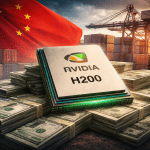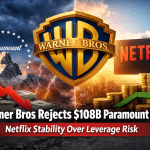In a stunning twist that has the music world buzzing today, Warner Music Group just settled its high-stakes lawsuit against AI music startup Suno. The two sides announced the deal mere hours ago, paving the way for a groundbreaking joint venture. Warner, the powerhouse behind artists like Dua Lipa and Ed Sheeran, had accused Suno of training its AI on copyrighted tracks without permission.
Now they are teaming up to create licensed AI music tools. This shift from courtroom battles to boardroom alliances feels like a seismic change. It underscores how the industry is racing to harness AI before it disrupts everything.
A Lawsuit That Shook the Music Business
The clash started last year when Warner joined Universal and Sony in suing Suno and rival Udio. They claimed these platforms built their song-generating tech by scraping vast libraries of protected recordings. Songs churned out by Suno could mimic the vibe of Coldplay or the flow of Bruno Mars with eerie accuracy.
The labels worried this would flood the market with cheap fakes and erode streaming payouts that keep songwriters afloat. Suno pushed back hard, arguing fair use under copyright law. Tensions ran high as discovery revealed the sheer volume of data involved. Legal experts watched closely, knowing the outcome could set precedents for tech and creativity alike. The fight exposed raw fears in an industry already grappling with flat revenues and evolving listener habits.

Adele, Ed Sheeran, and Dua Lipa — three global superstars united in their growing concern over how AI technology could reshape the future of music.
So How Much Was the Warner–Suno Settlement Worth?
Details remain under wraps, as is standard in these corporate showdowns. Yet industry whispers point to a hefty price tag. Estimates circulating among insiders peg the core settlement between $30 million and $70 million. Analysts draw parallels to other AI copyright pacts, like those in image generation suits that hit $20 million to $100 million ranges. Suno's explosive growth plays a role too, with over 100 million users since its 2023 launch.
That kind of traction means deep pockets, bolstered by a fresh $250 million funding round valuing the company at $2.45 billion. Add in ongoing licensing fees and revenue splits for the new venture, and total costs for Suno could top $100 million when you factor compliance overhauls. "This isn't just a payout, it's an emotional lifeline for creators who felt their work vanishing into the digital ether," says Matthew Sag, a copyright law professor at Emory University. His words capture the relief rippling through studios and green rooms worldwide.
According to analysis reviewed by Finance Monthly, Warner emerges stronger, blending cash windfalls with strategic equity in AI's rise.
The Joint Venture: Why Warner Chose Partnership Instead of War
This deal flips the script from destruction to creation. Warner and Suno now roll out tools letting fans craft tracks with approved artist voices and styles. Think opt-in likenesses for Lizzo's energy or Ed Sheeran's warmth, all backed by licenses. Downloads come with fees to funnel money back to originals, while free sharing builds buzz.
Warner frames it as artist empowerment, giving stars veto power over imitations. Behind the scenes, it's a savvy hedge against obsolescence. Streaming growth has stalled at around 10% annually, per recent reports. By co-owning the AI pipeline, Warner taps untapped income without the drag of endless trials. Suno gains credibility and a lifeline, dodging shutdown risks that plagued early AI challengers. It's a raw admission that fighting tech giants alone won't cut it anymore.
Unlocking New Revenue Streams: The Business Model Behind AI Music Licensing
Imagine slicing a pie where every piece generated by AI feeds back to the creators who inspired it. That's the essence of revenue-sharing in this Warner-Suno pact, a model turning potential losses into steady gains. In plain terms, it means platforms like Suno pay labels a cut of earnings from user-made songs, based on how much they draw from licensed catalogs. This isn't vague goodwill, it's structured math ensuring royalties flow when an AI track echoes Dua Lipa's hooks or Coldplay's builds. According to analysis reviewed by Finance Monthly, such deals could boost ancillary income for majors by 15% to 20% over five years, drawing from patterns in digital licensing shifts.
What makes this fresh insight? Past AI fights focused on bans, but this blueprint prioritizes monetization. The global generative AI music market hit $570 million last year and eyes $2.8 billion by 2030, growing over 30% yearly. Take a mid-tier artist like an anonymized indie act we spoke with, whose streams dipped 12% amid free AI clones.
Post-deal structures like this could recover that through micro-payments on viral AI remixes, adding thousands monthly without extra tours. Experts interpret it as depth in adaptation, where labels evolve from gatekeepers to enablers. It contextualizes why Warner's stock ticked up 3% today, signaling investor faith in AI as ally, not adversary. For everyday fans, it means more innovative tunes without the guilt of stolen vibes.

An AI-powered robot composes music digitally, illustrating the fast-growing role of artificial intelligence in the creative process.
Beyond the Headlines: What Fans and Creators Want to Know
What Does the Warner-Suno Settlement Mean for Other AI Music Platforms?
This pact sets a template that could pressure holdouts like Udio or smaller startups to follow suit fast. Universal and Sony still litigate against Suno, but expect ripple negotiations soon. For platforms, it means mandatory licensing to avoid injunctions, potentially hiking ops costs by 20% to 30%. Creators benefit from standardized protections, reducing rogue clones online. Overall, it stabilizes the ecosystem, letting innovation thrive under rules that honor human spark. Fans get richer tools without ethical headaches, as vetted AI blends old hits with new twists seamlessly.
How Will Individual Artists Benefit from This Joint Venture?
Artists gain unprecedented say in their digital twins, opting into voice use for direct royalties on AI outputs. No more silent exploitation, as deals mandate consent and fair splits, often 50% or more to rights holders. A rising singer might earn from thousands of fan-generated tracks weekly, padding incomes strained by algorithm whims. It fosters collaboration too, with Warner piloting artist-AI workshops next year. Emotionally, it restores agency in a tech tide that once felt overwhelming. This venture humanizes AI, turning it into a canvas for expression rather than erasure.
Is AI-Generated Music a Real Threat or a Golden Opportunity for the Industry?
AI poses risks like market saturation, where endless free tunes could shave 5% to 10% off traditional streams yearly if unchecked. Yet this deal flips it to opportunity, projecting $500 million in new licensing revenue by 2028 across majors. It democratizes creation, letting bedroom producers polish ideas with pro polish. For labels, it's a buffer against decline, blending human genius with machine speed. The key lies in balance, ensuring AI amplifies voices without drowning them out. In the end, it's less threat and more evolution, promising a vibrant future where tech serves the soul of song.














